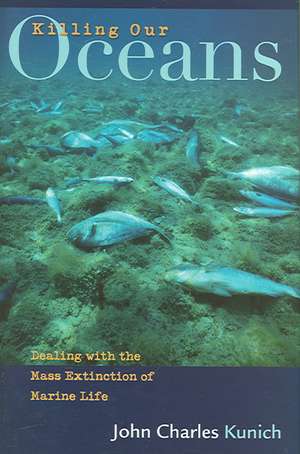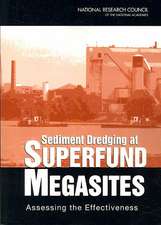Killing Our Oceans: Dealing with the Mass Extinction of Marine Life
Autor John Charles Kunichen Limba Engleză Hardback – 29 mai 2006 – vârsta până la 17 ani
Preț: 322.58 lei
Preț vechi: 392.56 lei
-18% Nou
Puncte Express: 484
Preț estimativ în valută:
61.73€ • 64.21$ • 50.96£
61.73€ • 64.21$ • 50.96£
Carte tipărită la comandă
Livrare economică 14-28 aprilie
Preluare comenzi: 021 569.72.76
Specificații
ISBN-13: 9780275988784
ISBN-10: 0275988783
Pagini: 256
Dimensiuni: 156 x 235 x 24 mm
Greutate: 0.55 kg
Editura: Bloomsbury Publishing
Colecția Praeger
Locul publicării:New York, United States
ISBN-10: 0275988783
Pagini: 256
Dimensiuni: 156 x 235 x 24 mm
Greutate: 0.55 kg
Editura: Bloomsbury Publishing
Colecția Praeger
Locul publicării:New York, United States
Notă biografică
John Charles Kunich is Associate Professor of Law, Appalachian School of Law, Virginia, and the author of several books.
Cuprins
PrefaceHotspots Under the Sea: Hotter Under the Water?Law of the Sea and in the SeaFinding or Losing Nemo, One Nation at a TimeChoosing to Stop Killing Our OceansThe Greatest Unknown
Recenzii
It's long been known humankind is destroying the oceans, and plenty of titles have surveyed the problem: what makes Killing Our Oceans: Dealing With the Mass Extinction of Marine Life different is an extension of the author's prior analysis of threatened hotspots from land to pockets of ocean life. Here also is a focus on international law and regulations pertaining to the ocean, along with efforts and language of domestic laws of nations with such key marine resources another differentiation which makes Killing Our Oceans a powerful recommendation not just for college-level science holdings, but collections concerned with international legal applications of social issues. It's this dual legal and science approach which makes for a top pick, here.
Kunich argues that the earth is in the midst of its sixth mass extinction of species and that the extinction is perhaps hitting the world's oceans the hardest. Further, the legions of domestic and international laws that are supposed to ensure the health of the oceans have done nothing to address the problem and instead act merely as a dangerous placebo. After detailing this situation, he proposes a new legal paradigm for safeguarding marine life; one that is based on an incentives-based statutory approach similar to the US Congress's Tropical Forest Conservation Act of 1998.
[P]resents an overview of basic oceanography and explains that the current massive extinction of ocean life has one primary cause: humankind. Asking why, if we're responsible for this distruction, we don't take responsibility for it..Kunich believes that individual nations have too narrow a view of the dire situation and that the lack of a world court with enough clout to settle international disputes effectively perpetuates our destruction of marine life. Kunich concludes with thought-provoking proposals for the establishment of worldwide ocean protection and conservation.
Kunich argues that the earth is in the midst of its sixth mass extinction of species and that the extinction is perhaps hitting the world's oceans the hardest. Further, the legions of domestic and international laws that are supposed to ensure the health of the oceans have done nothing to address the problem and instead act merely as a dangerous placebo. After detailing this situation, he proposes a new legal paradigm for safeguarding marine life; one that is based on an incentives-based statutory approach similar to the US Congress's Tropical Forest Conservation Act of 1998.
[P]resents an overview of basic oceanography and explains that the current massive extinction of ocean life has one primary cause: humankind. Asking why, if we're responsible for this distruction, we don't take responsibility for it..Kunich believes that individual nations have too narrow a view of the dire situation and that the lack of a world court with enough clout to settle international disputes effectively perpetuates our destruction of marine life. Kunich concludes with thought-provoking proposals for the establishment of worldwide ocean protection and conservation.




